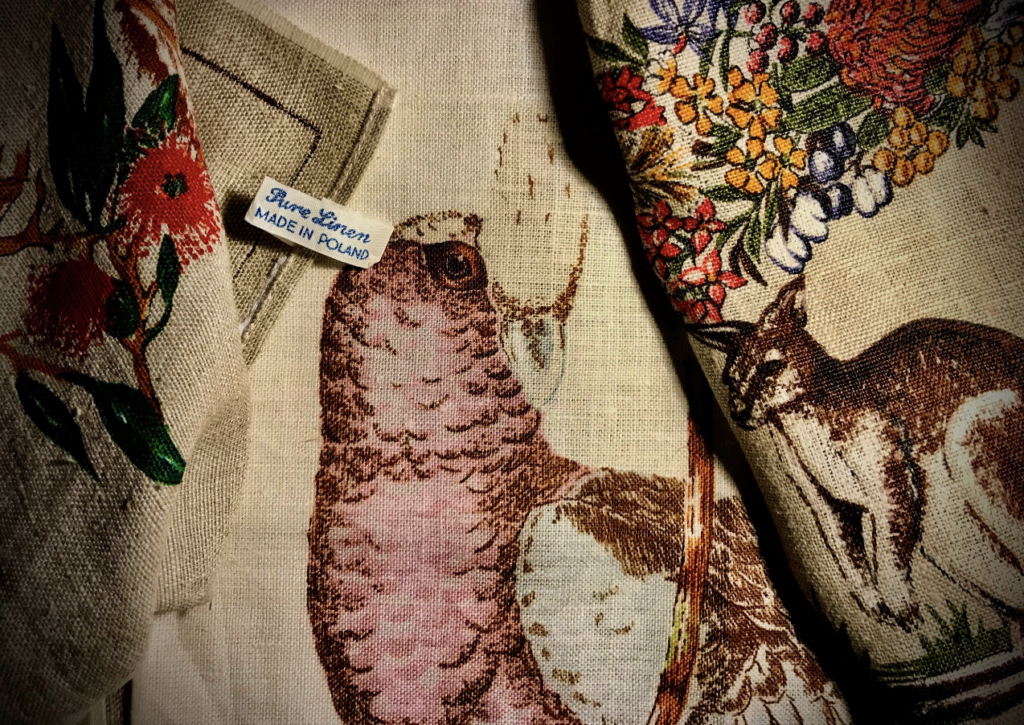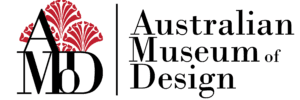
Image of souvenir tea towels, made in Poland, provided by Dr Grace Pundyk
Connecting Threads
with Dr Grace Pundyk
When I first heard about Dr. Grace Pundyk’s journey, I was immediately captivated. Her passion for uncovering the hidden stories behind Australian linen designs resonated deeply with me. This story truly underpins the purpose of the Australian Museum of Design as a vital resource for Australian design history.
It’s through stories like these that my own love and passion for art and culture are ignited, making this one of the most special projects I’ve ever been part of. The spirit of everyone – across Australia and the world – coming together to share their stories and missing pieces of information lays the foundation for preserving our unique Australian design history.
In recent months, I’ve had the privilege of speaking with Dr. Grace Pundyk, a Visiting Fellow at the ANU Centre for European Studies, as she embarks on a fascinating exploration into the history of Australian souvenir linen. It all began when Grace stumbled upon a vintage Australian tablecloth, distinguished by its unique Australian botanical design. What intrigued her most was the unexpected label on the mat: ‘Made in Poland’.”
Grace’s interest in this project took root in a deeply personal story. She was given a mourning photograph of her Polish grandmother, who died in a Soviet workcamp in the 1940’s. Resting in her coffin, her grandmother’s body was covered in flowers – hand-made paper flowers, in traditional Polish style – a vibrant and heartfelt gesture of friendship and solidarity among the women who had been deported with her to Soviet Russia. These flowers also adorned her head, like a flower crown, so common in Eastern European cultures. It was through this powerful image of love and resilience that sparked Grace’s own passion for creating flower crowns, which she makes from vintage Australian souvenir linen, ‘Made in Poland’, and Japanese silk and linen threads. She describes the making of these flower crowns as a ‘celebration’ of familial threads, a way that connects her to her Polish roots and also to those of her Japanese grandson.
“Around the same time I was given the photo of my grandmother, I ‘found’ my first Australiana, Polish linen tablecloth in a secondhand shop, while I was doing my PhD. The design is beautiful with native fauna and flora adorning thick, coarse linen. I was only vaguely aware before finding this piece that there were Australiana textiles ‘Made in Poland’.”
This personal connection, and also through working so closely with the souvenir linen, propelled Grace’s research into the Polish textile industry during the communist era. She sought to understand how Australian designs, like the tablecloth she found, were produced in Poland during this time. Her investigations have taken her to Poland, where she has uncovered a rich history of textile printing under the restrictions of communism, and back to Australia where she is continuing to explore the various facets of souvenir textile production here. In fact, it was while she was following up a lead in Tasmania, where she made an astonishing discovery…
There, in an old design house, she found fragments of souvenir napery and handwritten instructions – guides on how to reproduce Australian designs that were sent by post to Poland for printing. This link between two distant nations through textiles and design brought new depth to her research.
While exploring the Australian Museum of Design’s website, Grace made another remarkable connection. She instantly recognised the distinctive style of Donald Clark, one of the featured artists, as closely related to the designs she had been researching. Clark’s unique hand-drawn illustrations seemed to resonate with the Australian botanical designs that inspired her project, leading her to AMoD with the hope of uncovering the source of the original artwork.
Dr. Grace Pundyk’s research reveals the unexpected global connections behind Australian souvenir linen and the exchanges between Australia and Poland during the 20th century. Her work not only unearths forgotten histories but also connects personal heritage with broader cultural threads, weaving together a narrative of love, art, and design across generations.
Among the handful of original hand drawn designs in our AMoD studio, we have some film positives that are still sealed with sticky tape for more than 50 years, unseen since they were last rolled up and closed from public view.
We cannot describe our day as a treasure hunt. It was serendipity at its best. My hand hovered over the rolled-up films, and of all the ones to choose from, I pulled out a heavy, unmarked roll of designs, not really expecting to find anything that would connect this story, but it was a start!
As we carefully removed the sticky tape that held it together, we couldn’t believe that we were unrolling the entire collection of Donald Clark napery designs of Australian botanicals.
Not only could we see the original hand-drawn designs that were viewed upon for the first time in more than 50 years, we were able to match them up with the actual napery products that were generously donated to AMoD by Donald Clarks family.
To paint the incredible picture here, we are talking a span of more than 50 years, and stories that reach across countries, from Australia to Poland and back, to find the actual hand-drawn designs on film positive that were then turned into silk screens for hand printing and creating famous napery pieces.
These designs were so desirable, it appears that they may have found their way to Poland for reproduction.
Based on a photo taken of Grace’s grandmother in her coffin adorned with flowers, which inspired the creative artistry of hand-made flower crowns by Grace, and back to Australia to the Australian Museum of Design and the PowerHouse Museum, to match all the missing pieces together.
Grace has collected Australian napery pieces over the last 5 years which she carefully cuts the flowers from to create her intricate flower crowns.
Grace gasped today when she finally saw the first and original piece by Donald Clark, so similar to the pieces she’s been working with and which inspired her to start this incredible journey to find out how Australian designs came to be made in communist Poland.
Donald Clark’s family were unaware that his designs were being produced in Poland, albeit they were aware of the quality Polish/Czechoslovakian linen to print their table cloths, placemats and other pieces. Even so, a 1991 interview with Donald Clark for a local Sydney newspaper perhaps goes some way to explaining how this production path unfolded:
“The major stores that we catered for decided to take our ideas overseas, where production was cheaper”, Clark explained. “It’s a pity we missed the tourist boom because we were too early for the market.”
Today, we were able to match these original designs with the finished napery products. A special recognition to Liz Clark (niece of Donald Clark) who first introduced herself to the Australian Museum of Design several years ago, and the fun we had together going through the memorabilia she had retained over the many years. Without this introduction, this remarkable story would not have been possible, nor the designs coming full circle, inspiring Grace’s flower crowns and connecting threads between Australia and Poland in ways no one could have imagined.
Australian Hand Drawn Design
Made in Poland
by Dr Grace Pundyk
Australian Hand Drawn Design
Australian Hand Drawn Design
by 'Marika'
by Dr Grace Pundyk
Australian Hand Drawn Design
by 'Marika'
by Dr Grace Pundyk
Australian Hand Drawn Design
Australian Hand Drawn Design
Australian Hand Drawn Design
Australian Hand Drawn Design
Australian Hand Drawn Design
by Dr Grace Pundyk
Australian Hand Drawn Design
Images curtesy of Dr Grace Pundyk
Largest body of Australian designs
Unseen by the public for more than 50 years
There’s nothing like a revival…


